Student Blog
Diversity
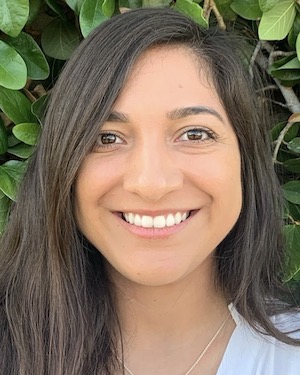
First Gen Problems ⟩
June 12, 2020, by Liz
Diversity
Ever since COVID-19 happened I’m sure we’ve all had to make some changes in several aspects of our lives. One major change I made, like so many other students, was switching to remote learning. Whether you’re about to start classes soon this summer here at Chan, or completing some prerequisite courses elsewhere, don’t be afraid . . . IT WILL BE OKAY!
When this whole thing started, I decided to move back home with my parents in Santa Ana. I was afraid the loneliness would get to me if I stayed at my apartment in LA all alone and remote learning seemed like a good opportunity to move back home for a bit. At first, moving back was fine. It was great to spend more time with my family and enjoy my mom’s home cooked meals. BUT, what I didn’t know was that being back home would actually result in me feeling more stressed and overwhelmed than ever.
Like many other first generation students, one of the reasons I chose to pursue a higher education (other than my love for OT, of course) was because I want to take care of my parents at some point. I don’t want my mom cleaning houses or my dad taking care of people’s landscaping forever! So, when I moved back home that stressor that had been stored somewhere in the back of my mind, made itself very visible again. My family lives in a small apartment, so when I would hear my dad get up at 4 AM to get ready to get to work it felt almost impossible to fall asleep again. I was constantly thinking about how much older he’s getting and how much I wished he could just stay in bed and drink his coffee when the sun was actually out. Seeing my mom come home exhausted and complain about her back pain didn’t make things any better. That pressure and stress I was able to almost forget about when I was in LA just didn’t go away, and I could feel how it was taking a toll on me emotionally.
To make matters worse, it was extremely difficult to focus on getting my work done for class. My family was constantly trying to hang out (don’t get me wrong I love them, but COME ON I have some work to do!). I started to feel bad because I felt like family time was what they looked forward to since we were all staying home, and I wanted to cater to their needs. It almost made me feel selfish to tell them I had work to do for school. So, I ended up staying up WAY past my usual bedtime just to get my work done because my family was so distracting.
It finally got to the point where I was too overwhelmed by my stressors of being back home and my school work. So, I decided I had to make some changes. My first step was to talk to my parents and my sister about how I was feeling. I had to explain that my school work was not something I could continue to put off and complete late at night. I don’t know if anyone else’s parents are like this, but my parents seem to think going to school is an easy job. Which honestly, is kind of understandable. Compared to their taxing jobs I’m sure sitting at home on a computer seems easy peasy. But, it’s still unfair to me and my feelings. So, I decided to show them more of what I was doing. I translated what I was learning and why it was important.
Second, I thought about how I could still spend some time with them while also being able to take care of myself and my responsibilities. I ended up taking virtual zumba classes with my mom in order to make her feel like she was still a priority to me. Let me tell you, zumba is not easy and my mom is a lot more coordinated than I am — embarrassing, I know. I would also run small errands with my dad whenever possible. If he had to run to the grocery store and I needed a study break, I would spend my study break with him. Finding these little ways to make time for my family helped so much and gave me more room to get my work done.
As for my emotional stressors, every night before bed I would think about three reasons why I was proud of myself. This helped me see that there’s so much to be happy about and that I shouldn’t be so hard on myself. So, if you are a first generation student feeling overwhelmed by all of the things you feel like you have to do, don’t. You are already on the right track. You’re here (or on your way), and you can do this! And also, show and explain to your parents what you’re working towards. I am 100% sure they would be so happy to see it and learn about what you’re doing. Summer is right around the corner and you will be amazing. Check out Savi’s blog post on the benefits of remote learning next! Fight on!
⋯
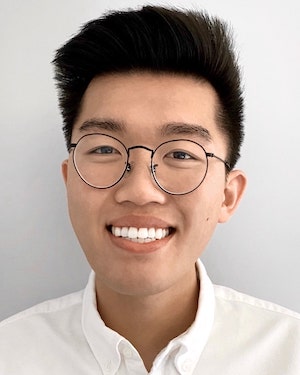
Black Lives Matter ⟩
June 8, 2020, by Calvin
Diversity
It’s been an extremely unfortunate time right now and I know that so many of us are going through a lot of emotions. Like many of you, I feel disappointed, angry, frustrated, and scared by the current events surrounding the unfair deaths of Black lives. As I’m watching the news on the ensuing nationwide protests for social justice, I’m witnessing the collective trauma being experienced by many, and I am also reflecting on how I can help.
I am proud to be part of the Chan Community, where the USC Chan Division has been committed to addressing these matters by fostering an inclusive educational environment, sharing multiple resources, and holding safe space meetings. It’s reassuring to know that our community is being supported by the division and I’m very much looking forward to attending these meetings.
As an Asian American, I used to believe that this was not my place to speak up and that this was not my fight. I believed that if I felt like I was going to say something wrong, then I shouldn’t say anything at all. In the past, I was silent and scared to have these difficult conversations with my friends and family. I remember times when friends would use derogatory language against certain communities and when my immigrant family members would share their opinions without first attempting to understand. I didn’t say a word to try and correct them. I wasn’t able to resist my complacency.
Throughout my upbringing, I had internalized anti-blackness and my mind was shrouded by the model minority narrative that continues to divide Asian and Black communities. This myth grants exploitative privileges that are weaponized against Black and Latinx communities. I was ignorant to be part of such a detrimental perception that downplays racism in the struggles of other minority groups, especially Black people.
However, as I have grown and reflected on myself and my privilege, I have come to realize that there are many ways to practice allyship in solidarity. By acknowledging the internalized racism embedded within myself and my culture, I have been able to reflect on my actions and challenge my assumptions. I’ve also been trying to promote this dialogue with my family to educate them on the injustices that Black people face. While I am grateful that they are gradually starting to be more open to talking about these topics, I also know that this is just the first step.
Black communities continue to experience barriers to their occupational rights and they continue to have their lives senselessly taken away by authorities who thrive off of this unjust system. It’s very clear that we are still fighting against systemic racism and acts of oppression, and it is so important, and has always been, that we organize and mobilize together in order to educate ourselves and support the Black community.
As future OTs, part of our work is to create a space to listen to the voices of those who are marginalized and oppressed, and to those who don’t have a voice, so that we can help advocate for them. However, we must also challenge people’s assumptions, acknowledge when there is boundary-crossing, and utilize our leadership to foster a supportive and safe environment for our clients and colleagues.
I hope that you can join me in taking this time to reflect and ask ourselves these questions:
- What can I do to continue putting in this effort?
- How can I use anti-racist knowledge to start this dialogue?
- How can I inform myself to continue thinking about these topics?
Here, I share with you all a document that contains links and additional resources to educate yourself, sign petitions, donate, and so many other ways for you to take action. I hope that everyone is staying safe and healthy and that you’re able to take care of yourselves as needed.
Thank you.
⋯

Why OT? ⟩
June 1, 2020, by Liz
Diversity What are OS/OT?
As I reflect about my time thus far at USC Chan, I come to appreciate the diversity in the program and everyone’s unique story in finding occupational therapy. It’s always great to know that no matter the “why,” we all hold a special love for OT. Some learned about OT through their family members, others have had loved ones receive OT services, and some have personal stories about their journey as the recipient. As for me, the story is a little different!
As the proud daughter of a landscaping gardener and housekeeper, growing up I wasn’t introduced to professions outside of what my family knew. However, when I was about 12 years old, my grandmother obtained a traumatic hand injury while in the passenger’s seat of a terrible car accident. She was an undocumented, uninsured individual in our country and could not afford the care she needed. Due to these barriers, my family could only afford to pay for her pain medication. Over time her injury healed, but her wrist permanently remained curving in towards her thumb — radial deviation. The accident negatively impacted my grandmother’s ability to engage in activities she found meaningful. She found it challenging to dress herself independently, make tamales, and walk her dog. This took a toll on my grandma’s self-esteem and created a deep feeling of frustration. I took it upon myself to help my grandma by doing some of those things for her, but what I discovered was that she wanted to do them herself. So, I tried helping my grandma find ways to participate in those activities as best as she could. Sure, it wasn’t the work a 12-year-old should be doing, but it was so fun! I loved seeing my grandma smile every time she was able to put on her favorite red lipstick by herself. Of course, we still had a bit of cleaning up to do around the edges, but it was amazing!
Years later, I ended up at CSUF with the hopes of pursuing a career as a Spanish teacher. I was taking a kinesiology course to fulfill one of my GE requirements and one day a few seniors came in to present on their internship experience. One of those presentations spoke about occupational therapy! Of course, I went home and did my research and was immediately converted when I knew I could work with individuals recovering from hand injuries. However, as time went on, I discovered that my passion went beyond wanting to help people recover from such injuries. My interest flourished into a love for wanting to provide culturally sensitive care for those from lower-socioeconomic statuses, a barrier faced by my grandmother and many others from similar communities. I am grateful that OT provides me with the opportunity to do so. The best part is that I get to work towards my goal with the support of my amazing academic mentors and supportive peers. I look forward to continue representing the Latinx community and am excited to continue growing as a future OT!
⋯
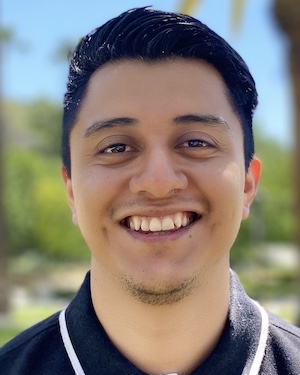
Why I Chose the OTD? ⟩
May 31, 2020, by Daniel
Diversity First-Gen What are OS/OT?
For me, pursuing the OTD means much more than just pursuing an education. It represents years of overcoming systematic barriers and paving the way for more first-generation Latinx students. Along the way, I have been fortunate to have a support system that believed in me, which I call my village (family, friends, mentors). As a first-generation Latinx student, pursuing an education comes with many other responsibilities. Personally, my entire college career I’ve had to work almost full-time, financially help my family, deal with imposter syndrome, and felt lost along the way since I am the first in my family to pursue higher education. My dream has always been to earn a doctorate degree, however, I never thought it would be financially possible. During Fall 2019, I began contemplating my options and whether it was possible to pursue the OTD. I struggled with constant questions of, “How can I pay for this?”, “Should I just start working after graduation to help my family out?” This was a time full of emotions and feeling stuck. Fortunately, I was able to ask questions, lean on my support system and this provided clarity. I reflected on my future goals of wanting to teach someday, starting my own non-profit organization, and promoting Latinx representation and leadership in OT, and decided the OTD would better prepare me to pursue these goals. Furthermore, I reflected on the communities I seek to make an impact on and decided to pursue a USC Chan Residency in primary care. Now that I am starting my residency training at the LAC+USC Adult West Primary Care Clinic, I truly believe I made the right choice. I am excited to continue to grow working along my faculty mentors Dr. Beth Pyatak and Dr. Jesús Díaz, and learn the necessary skills to expand OT services in primary care. I look forward to sharing my OTD journey with you and helping you find yours!
⋯
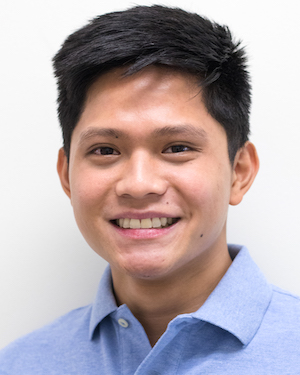
GI’s IG takeover! ⟩
April 14, 2020, by Japeth
Diversity International
First and foremost, I want to say that this blog post is dedicated to Global Initiatives, headed by Dr. Danny Park together with his team members James, Mariah, LiShan, Maggie, Katie, and Prutha. They have been doing a wonderful job in making the international students at USC Chan feel at home by organizing different activities (not to mention the free food that they always prepare!!!).
Some of the activities that we all enjoyed were:
- Global Corner (Meet and greet with local and international Chan students)
- Beach bonfire (I remember this happened around November and it was one of the best activities for me!)
- Thanksgiving dinner (It was their way of letting us feel the American culture during this occasion. I actually made a blog post about this!)
- Chinese New Year dinner (We had dinner in Chinatown together with faculty and staff; they also prepared games and activities)
- International Alumni Panel: Life after Graduation (This was supposed to be an in-person event, but due to the work-from-home set up, we had this online. It was an informative session where current international students like me, learn from alumni from different batches about tips on finding jobs, OPT processing, visa sponsorship, and many more!)
Sharing with you some snaps of the Life after Graduation event:
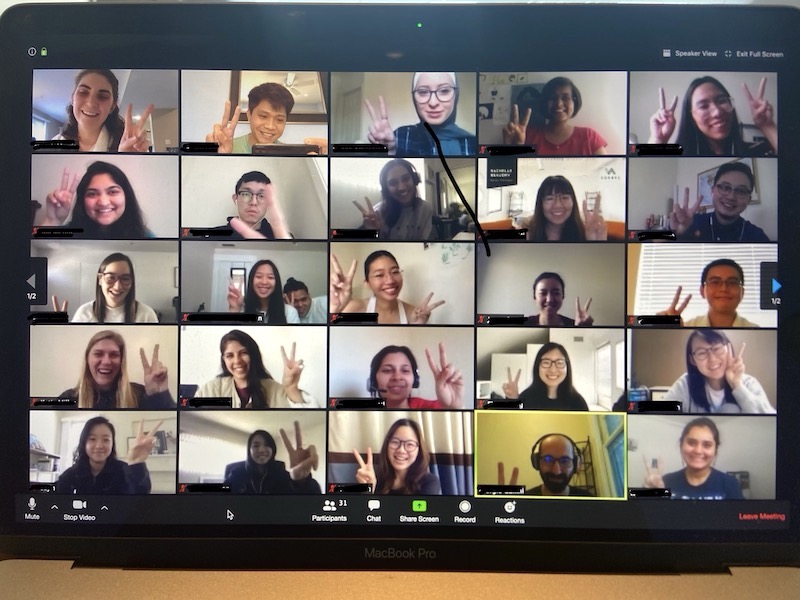
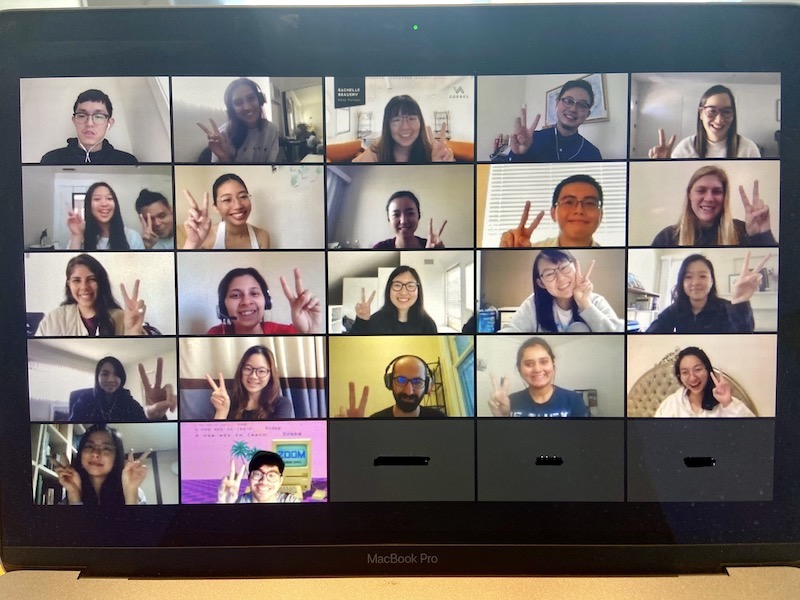
Actually, below is the highlight of this blog post — their latest Instagram Takeover where each of the team member has a day to show what their life is like! Being far from them and not having the usual bonding time that we used to enjoy makes me (and I’m sure the other students as well) really sad; but this takeover project made a way for us to know each other more despite the distance!! The photos below were just screen-captured from their official Instagram account. You may follow them on instagram (@uscchanosotglobal).
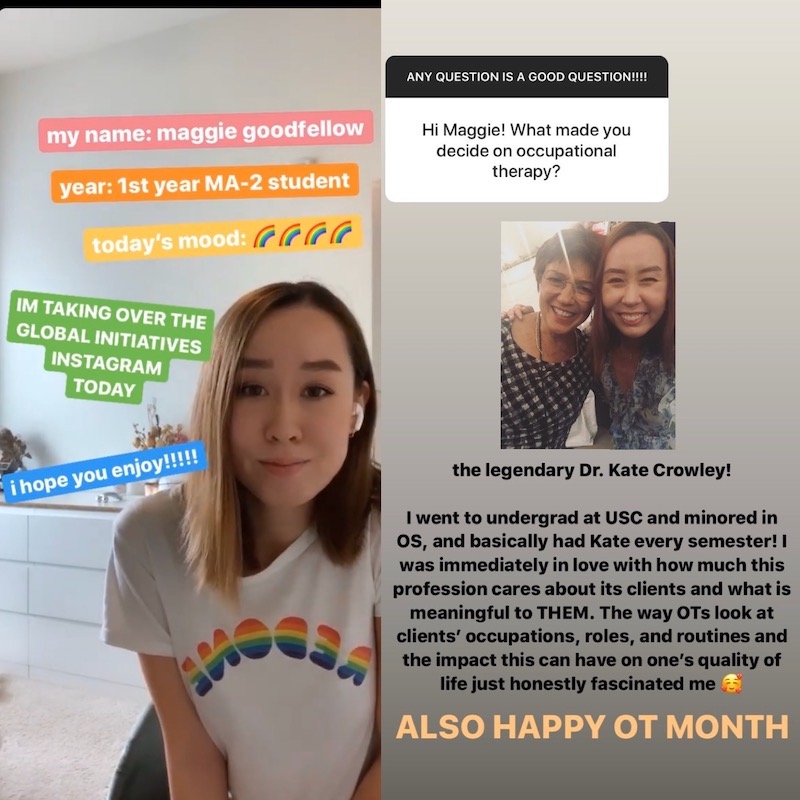
This is Maggie, one of my good friends here in LA! We became close because we see each other often at the office and extended our hangouts by drinking boba and eating Asian food! I couldn’t agree more with you on your explanation about OT, Maggie!
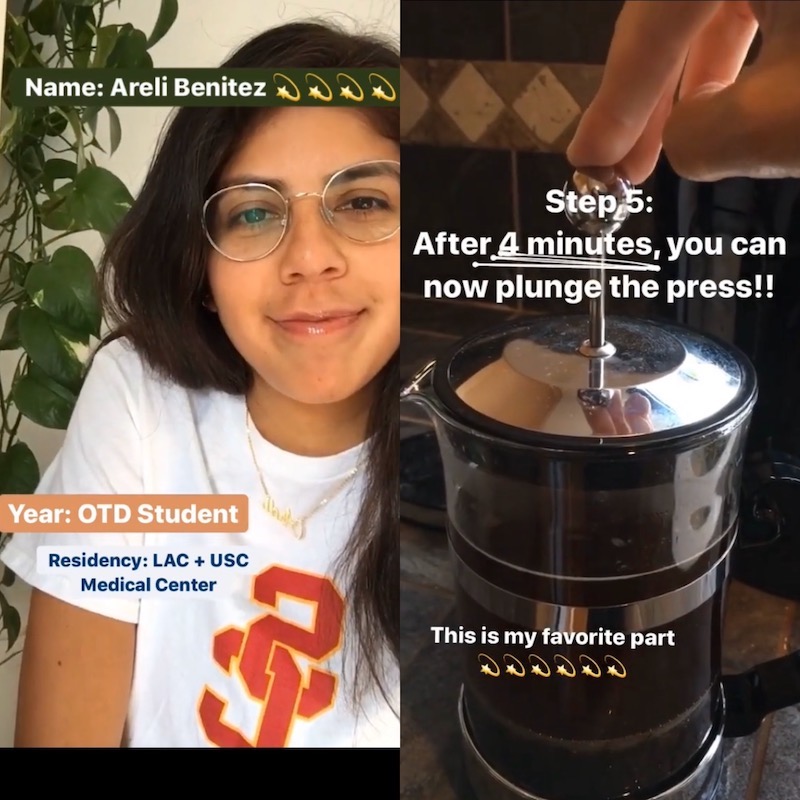
Although Areli and I only started seeing each other at the office during spring semester, we already had fun conversations about life, school, and everything in between. She’s also a coffee lover! Nothing that a coffee can’t fix, right Areli?
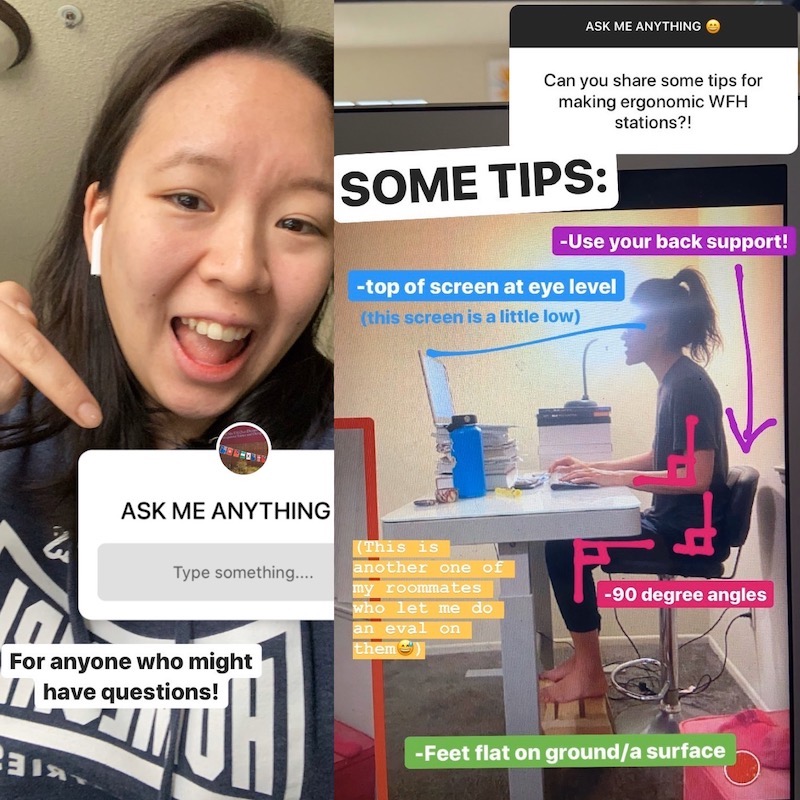
This is my small group leader LiShan! She was one of the first people who welcomed me at USC Chan and she also prepared a birthday cake for me last year during my birthday — that’s how thoughtful she is! Thanks for sharing some ergo tips too! We all can’t thank you enough for your thoughtfulness, LiShan.
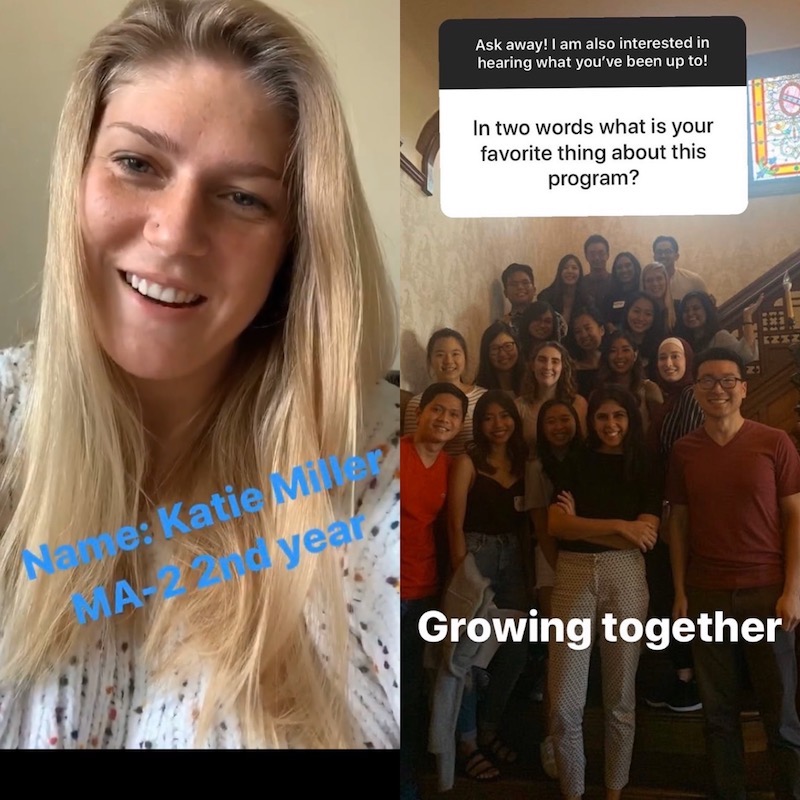
No one can ever balance life better than this lady! Katie has organized many activities outside of school just to make sure that we are all enjoying our time here in LA. From oganizing fun activities to study session, Katie does it best! Thank you for allowing us to “Grow Together”!

Greetings from Minnesota to the world! Mariah is one of the Doctoral residents under Global Initiatives (together with James, another good friend!). She always fascinates me with her insight about life, politics, economy, and many more! And oh, you just made me crave tacos, Mariah!!
And that’s just the first wave of their Instagram activities. Rumor has it that they will do another takeover where they will share their travel pictures — exciting!! I hope they have pictures where they do a Fight On pose!! LOL
⋯





